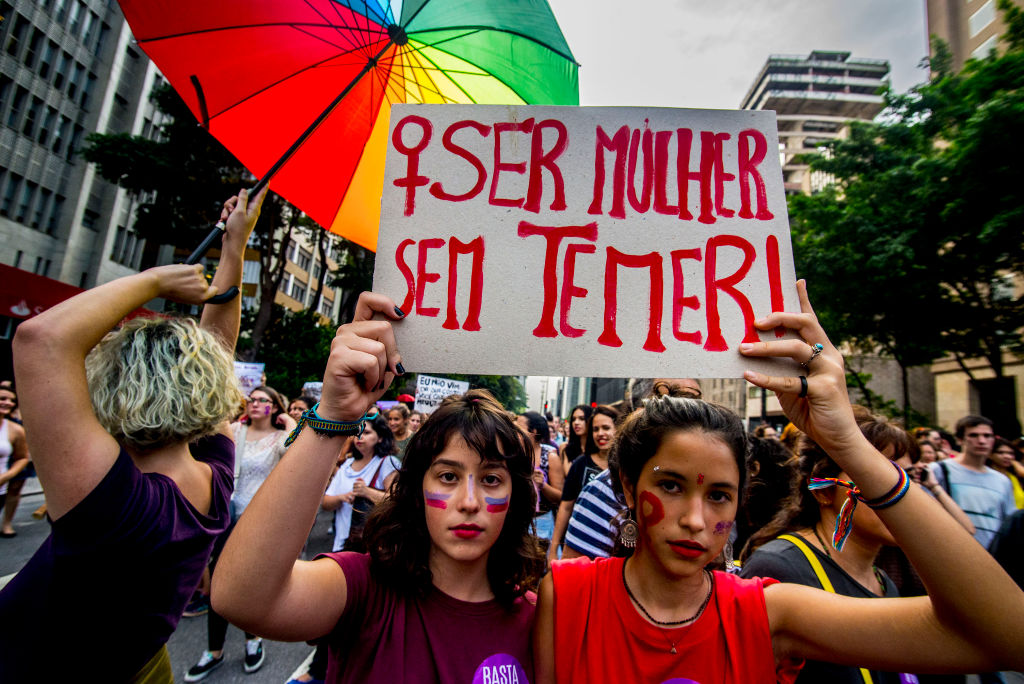SÃO PAULO—Gender-based violence in Brazil, a longstanding problem in Latin America’s most populous country, has reached alarming levels. In the last 12 months, 37.5% of women aged 16 and over experienced some form of violence. This is the highest rate recorded since the local think tank Fórum Brasileiro de Segurança Pública, known as FBSP, started monitoring the issue in 2017.
The data presents a concerning situation for the 21.4 million women involved in these incidents and for our society as a whole: Despite extensive public debate on gender roles and gender-based violence, there has not been a significant reduction in the number of victims, nor have more individuals sought help. It is our responsibility to understand these statistics and advocate for public policies that address this issue.
In 2015, women from all over Brazil took to the streets to defend the few sexual and reproductive rights constitutionally guaranteed to women. According to Brazilian law, abortion is only allowed in three specific circumstances, and access to legal abortion can be limited due to a lack of services and medical professionals’ refusal. When former congressman Eduardo Cunha presented a bill aimed at extinguishing these few paths to legal abortion and criminalizing the procedure entirely, protests took place throughout the country for weeks until the bill was dismissed.
By then, protests were not just about the bill. Women were marching to denounce the many other aspects of gender inequality in Brazil—today, the period is referred to as the “women’s spring.” It lit a fuse: gender inequality has never been talked about so much in our country. Women finally have the language and the words to discuss this problem, a crucial step toward solving it.
Brazil is not the exception. In 2015, women’s protests surged across Latin America and the Caribbean as feminists mobilized against gender-based violence, restrictive abortion laws, and persistent inequality. The marches around the region brought unprecedented public attention to issues such as femicide, sexual harassment, and women’s bodily autonomy, challenging traditional norms and pushing for legal reforms.
Over the past decade, Brazil has created new regulatory frameworks and updated laws to hold perpetrators accountable, but these measures alone have not been enough. This complex problem demands a broader response, from policies to enable women’s economic autonomy and improve education, to funding for programs benefiting at-risk women.
Diagnosing the problem
According to a 2025 survey by the FBSP, 40.7% of Brazilian women aged 16 and over say they have suffered physical, sexual, and/or psychological violence in their lifetime from a partner or ex-partner. Approximately 60% of these cases reported in the last 12 months occurred at the victim’s home.
The data shows that women don’t trust the state to guarantee access to justice and health, or to assign responsibilities to perpetrators of gender-based violence correctly. They feel they are on their own. The majority of women who have suffered severe violence in the last 12 months say they did nothing about the aggression they endured. In addition, most women say they were assaulted in front of witnesses, and 25% say they were assaulted in front of their children.
A factor contributing to this violence is the de-funding of public policies to prevent and combat gender-based violence during the government of former President Jair Bolsonaro, and under governors and mayors aligned with its views. On his first day in office, January 1, 2019, Bolsonaro abolished the Ministry of Women’s Affairs and created the Ministry of Women, Family and Human Rights, a gesture in line with his stated opposition to “gender ideology.” As a result, certain public policies were discontinued and the notion that women are primarily meant to be daughters and mothers was reinforced.
It’s also worth noting that the COVID-19 pandemic killed 700,000 people in Brazil in just three years and forced millions of Brazilians to change their habits and adopt social isolation measures. In the process, shelter services have been disrupted, and it has become even more challenging to assist women in situations of domestic violence.
Finally, there is a cultural aspect to this. A society immersed in misogynistic rhetoric repeatedly uttered by leaders and decision-makers engenders a cultural environment that authorizes aggressors to behave as such. Bolsonaro’s shocking public comments about women have caused uproar, and although he is currently banned from running for public office, bolsonarismo—the far-right movement originally built around him—remains a powerful political and social force in Brazil, continuing to shape public discourse, influence elections, and mobilize large segments of the population.
Legislative measures
It’s not all bad news. The Maria da Penha Law, approved in 2006, is considered a landmark piece of legislation in Brazil and one of the most significant tools in the world for combating violence against women. Since the mid-2010s, Brazil has enacted new regulatory frameworks that, when well-resourced and well-implemented, have made a big difference.
In 2015, the Femicide Law was enacted, establishing femicide as an independent crime specifically targeting women due to their gender. The Law on Sexual Harassment was enacted in September 2018 to criminalize sexual acts committed without the victim’s consent, whether in public spaces or in the workplace. A law was approved in 2021 to criminalize and penalize stalking.
But this work is far from over. Brazil can and desperately needs to do more when it comes to designing, implementing and monitoring effective prevention and protection policies. The women’s movement fights tirelessly to ease the hardships faced by Brazilian girls and women, constantly advocating for the creation of new penal types and pushing for new legislation and updated laws.
A broader response
Brazil has a long road ahead. While enhancing the criminal justice system is essential, it does not tackle the entire problem, which demands a broader response from policymakers and civil society. Brazil must create opportunities for at-risk women to earn a living and gain autonomy, enabling them to escape the cycle of violence.
In addition, the government should provide quality education for children from broken homes and ensure access to mental health resources for mothers. Investment in measures to prevent and eliminate violence against women must be a high priority at the local, state, and federal levels. This is essential for creating safer environments and ensuring effective responses to violence.
Funding should be allocated for the maintenance and expansion of women’s shelters, investment in care facilities and health centers, and providing rent and transportation subsidies for at-risk women. Additionally, training and education programs should be developed to empower victims and promote their autonomy. Resources must also be dedicated to data collection and public policy monitoring, along with the standardization of protocols for women to report crimes and seek assistance from public institutions.
President Luiz Inácio Lula da Silva’s administration has generally made positive contributions toward alleviating these issues. However, with general elections approaching next year, Lula has recently changed the leadership of the Ministry of Women’s Affairs, which he restored on his first day in office. This move appears to cater to the demands of his allied parties ahead of the October 2026 vote.
Therefore, Brazilian civil society must remain vigilant, as elections tend to dominate the political landscape and may overshadow issues such as gender-based violence. This urgent problem demands more attention from policymakers, and there is no time to lose.










